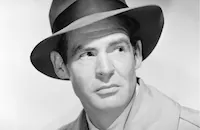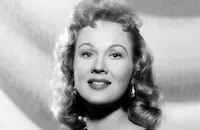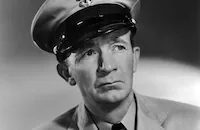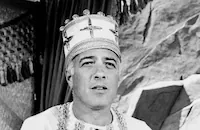The Proud Ones
Brief Synopsis
Cast & Crew
Robert D. Webb
Robert Ryan
Virginia Mayo
Jeffrey Hunter
Robert Middleton
Walter Brennan
Film Details
Technical Specs

Synopsis
In a Kansas cattle boom town, Marshal Cass Silver struggles to maintain law and order in the face of the town's greed and avarice. Anticipating the arrival of another trail crew, the citizenry greedily boosts the prices of goods and services, while Cass proposes to his longtime sweetheart Sally, the proprietor of the local boardinghouse. Cass's serenity is short-lived, however, when he learns that Honest John Barrett, a crooked casino owner who is his archenemy, has just bought the Palace saloon. Proceeding to the Palace to inspect the gaming tables, Cass is confronted by Thad Anderson, one of the trail crew, who accuses the marshal of shooting his father down in cold blood in the town of Keystone. After Cass uncovers a fixed blackjack game, he demands to see Barrett, and to protect his boss, one of Barrett's thugs shoots at Cass, grazing him in the head. Reflexively reaching for his gun, Thad kills Cass's assailant and is himself wounded in the crossfire. Grateful, Cass arranges for Sally to nurse the injured Thad and offers him a job as relief jailer. Soon after, Cass experiences a blinding headache, the result of his wound, that impairs his vision. Later, Sally visits Barrett and after warning him not to provoke Cass, informs him that she was the one who forced Cass to leave Keystone to avoid a confrontation. As Sally describes the incident at Keystone, Cass calls Thad into his office and recalls the night his father was shot. Cass explains that Thad's father, John Anderson, was working in Keystone for Barrett as a hired gun and that Cass shot him in self-defense. Shortly after the shooting, however, Barrett started rumors that Anderson was unarmed, thus forcing Cass to leave town or face down Barrett and his thugs. Shortly after Cass's revelation, Chico and Pike, two vicious gunslingers hired by Barrett, come to town to eliminate Cass. Thad, still simmering with anger over his father's death, approaches Barrett for a job as a gunslinger, but once Barrett rejects him, Thad accepts Cass's offer to be the relief jailer. After Cass arrests two of Barrett's thugs for trying to mug a drunk who won too much while gambling, Pike and Chico try to intimidate the marshal into freeing the men. Soon after, a gambler accuses the dealer of cheating and is gunned down by Dillon, Barrett's saloon manager. Although Dillon claims that he shot in self-defense, Cass arrests him when the dead man's friend accuses him of murder. Amid the mounting tensions, Cass's deputy, Jim Dexter, quits because his pregnant wife has begged him to look for a safer job. That night, Chico and Pike stalk Cass through the streets. Suffering another blinding headache, Cass dodges their bullets and then hurries to see Dr. Barlow, who warns him that he has pressure on his optic nerve and should see a specialist in Kansas City. Aware that his condition will make him easy prey, Cass asks the doctor to keep it secret. In the wake of Jim's resignation, Cass promotes Thad to deputy, and one evening, as they stroll through town, Chico, seemingly drunk and unarmed, nonchalantly threatens to kill Cass and then walks away. Cass, hearing the click of a gun cocking, fires at Chico and kills him, causing Thad to accuse him of being trigger happy. After uncovering the hidden gun from Chico's clenched hand, Cass shows the weapon to Thad, but Barrett, hoping to incite the boy, claims that he confiscated Chico's gun because he was drunk. The next day, Thad apologizes to Cass for misjudging him. Later, the city council summons Cass, and after criticizing him for harassing Barrett, asks for his letter of resignation. Cass refuses to tender his resignation until his prisoners stand trial and, after recommending Thad as his replacement, denounces the town for selling out law and order for the promise of a "quick buck." Sally, who has learned of Cass's condition from Dr. Barlow, insists they leave town that night, and after Cass declines out of a sense of duty, she exclaims that his pride will kill him. Their conversation is interrupted by the sound of gunfire, and Cass takes to the street to find that the prisoners have broken out of jail and murdered Jake, the jailer. As Thad and Cass track the fugitives to the barn, Dillon and the others lie in wait. In the ensuing shootout, Cass is blinded by another one of his headaches and confesses to Thad that he cannot see. Thad stands by Cass, who soon regains his vision and shoots down Dillon while Thad dispatches the others. After Cass is wounded in the melee, Thad helps him into Sally's carriage. Thad proceeds to the saloon to confront Barrett, and Cass instructs Sally to follow him. Thad strides into the saloon and informs Barrett that he is under arrest for murder. Making light of the situation, Barrett turns to the bar to pour a drink and palms a hidden gun, but Thad outwits him and shoots first. Smiling, Cass walks out of the saloon with Sally. When Sally insists on going to Kansas City for treatment, Cass agrees, asserting that, thanks to Thad, he no longer has to run away.

Director
Robert D. Webb
Cast

Robert Ryan

Virginia Mayo

Jeffrey Hunter

Robert Middleton

Walter Brennan

Arthur O'connell
Ken Clark
Rodolfo Acosta
George Mathews
Fay Roope

Edward Platt

Whit Bissell
Paul Burns
Richard Deacon
Frank Gerstle
Charles Tannen
Lois Ray
Jack Low
Ken Terrell
Harrison Lewis
Don Brodie
William Fawcett
Ed Mundy

Jackie Coogan
Juanita Close
Paul Gary
Tom Mcdonough
Harry Carter
Stan Jolley
Jeff Alexander
Glen Gordon
Renny Mcevoy
Steve Darrell
Duane Thorsen
Murray Parker
John Truax
Jack Mather
Leonard Geer
Mary Thomas
Jonni Paris
Howard Hoffman
Frank Green
Crew
Lucien Ballard
Leonard Doss
W. D. Flick
Hugh S. Fowler
Leland Fuller
Robert L. Jacks
Ray Kellogg
Charles Lemaire
Harry M. Leonard
Lionel Newman
Edmund North
Ben Nye
Maurice De Packh
Joseph Petracca
Ad Schaumer
Walter M. Scott
Fred R. Simpson
Travilla
Helen Turpin
Henry Weinberger
Lyle R. Wheeler

Film Details
Technical Specs

Articles
Proud Ones, The - Robert Ryan in the 1956 Western THE PROUD ONES on DVD
Ryan excelled at troubled, worried characters, and Cass Silver, his Proud Ones hero, is no exception. Cass is marshal of the fledgling town of Flat Rock, which is booming with the arrival of the railroad and cattle herds being sold there. But the boom is bringing in the vice with which Cass tangled in the town he recently left. Literally. Honest John Barrett (Robert Middleton), his nemesis there, has just bought the saloon in Flat Rock, and this shady entrepreneur brings rigged gambling and hired gunmen to the town. Barrett isn't just a professional nuisance, he's also a character assassin to Cass. He not only spread the tale that Cass was trigger-happy, by claiming that the hired gunslingers Cass shot during their last face-off were unarmed, but Barrett also claimed he ran Cass out of town, and that the lawman fled rather than stay and fight. In truth, it was Cass' girlfriend Sally (Virginia Mayo), a one-time saloon girl and now a Flat Rock innkeeper, who dragged him to Flat Rock.
But the trigger-happy reputation continues, and one of the trail hands who comes in to town with the first herd of cattle, is Thad (Jeffrey Hunter), who's long been told Cass gunned down his dad in cold blood and doesn't know his father was one of Barrett's hired gunslingers. After Thad helps Cass out during a scrape in Barrett's bar, the marshal explains to Tad the circumstances of shooting his father, and the younger man even becomes a deputy. But there's obviously still doubt in Thad's trust of Cass, and the movie hopes to squeeze tension out of a possible showdown between the two, and a probable showdown between Cass and Barrett.
Yet The Proud Ones doesn't generate all that much tension, for a number of reasons. For one thing, despite the widescreen capabilities of the CinemaScope process and the participation of cinematographer Lucien Ballard (Buchanan Rides Alone, The Wild Bunch), as creative a western cinematographer as anyone, it's not a very visually accomplished movie. You don't really feel the setting on a gut level as you do in the best westerns. The Proud Ones takes place mostly in the saloon and the jailhouse, as well as a few other interior locations, all of which have been lit very brightly and flatly. There's no mood here, no sense that literal and figurative darkness is lurking. Nighttime exterior scenes are more evocative of danger, but there aren't enough of them to add the needed texture to the story. There are also too many "Central Casting" touches to the tale: Walter Brennan as a codger (the sort of crotchety jailer role he'd do again in Rio Bravo), Rodolfo Acosta as a stereotypical Mexican bandito type, Whit Bissell as a high-strung shopkeeper and so on. The major characters also lack much distinction: the script gives Cass a convenient affliction (being grazed in the head by a bullet in the first altercation gives him dizzy spells that come at predictably inconvenient times) and it's a clumsy manifestation of Cass' vulnerability that cuts into Ryan's performance, while Thad is bland and Sally drops out of sight for a whole half-hour.
In other words, The Proud Ones comes off like just a souped-up version of serviceable TV-western action. The presentation might be deluxe, but presentation isn't everything. It's one of the many now-obscure movies by director Robert D. Webb, who was to make his most famous movie, Love Me Tender, just after this. As with that movie, the most remarkable thing about The Proud Ones is its star, not its story.
To order The Proud Ones, go to TCM Shopping.
by Paul Sherman

Proud Ones, The - Robert Ryan in the 1956 Western THE PROUD ONES on DVD
Virginia Mayo (1920-2005)
She was born Virginia Clara Jones in St. Louis, Missouri on November 30, 1920, and got her show business start at the age of six by enrolling in her aunt's School of Dramatic Expression. While still in her teens, she joined the nightclub circuit, and after paying her dues for a few years traveling across the country, she eventually caught the eye of movie mogul Samuel Goldwyn. He gave her a small role in her first film, starring future husband, Michael O'Shea, in Jack London (1943). She then received minor billing as a "Goldwyn Girl," in the Danny Kaye farce, Up In Arms (1944). Almost immediately, Goldwyn saw her natural movement, comfort and ease in front of the camera, and in just her fourth film, she landed a plumb lead opposite Bob Hope in The Princess and the Pirate (1944). She proved a hit with moviegoers, and her next two films would be with her most frequent leading man, Danny Kaye: Wonder Man (1945), and The Kid from Brooklyn (1946). Both films were big hits, and the chemistry between Mayo and Kaye - the classy, reserved blonde beauty clashing with the hyperactive clown - was surprisingly successful.
Mayo did make a brief break from light comedy, and gave a good performance as Dana Andrews' unfaithful wife, Marie, in the popular post-war drama, The Best Years of Their Lives (1946); but despite the good reviews, she was back with Kaye in The Secret Life of Walter Mitty (1947), and A Song Is Born (1948).
It wasn't until the following year that Mayo got the chance to sink her teeth into a meaty role. That film, White Heat (1949), and her role, as Cody Jarrett's (James Cagney) sluttish, conniving wife, Verna, is memorable for the sheer ruthlessness of her performance. Remember, it was Verna who shot Cody¿s mother in the back, and yet when Cody confronts her after he escapes from prison to exact revenge for her death, Verna effectively places the blame on Big Ed (Steve Cochran):
Verna: I can't tell you Cody!
Cody: Tell me!
Verna: Ed...he shot her in the back!!!
Critics and fans purred over the newfound versatility, yet strangely, she never found a part as juicy as Verna again. Her next film, with Cagney, The West Point Story (1950), was a pleasant enough musical; but her role as Lady Wellesley in Captain Horatio Hornblower R.N. (1951), co-starring Gregory Peck, was merely decorative; that of a burlesque queen attempting to earn a university degree in the gormless comedy, She¿s Working Her Way Through College (1952); and worst of all, the Biblical bomb, The Silver Chalice (1954) which was, incidentally, Paul Newman's film debut, and is a film he still derides as the worst of his career.
Realizing that her future in movies was slowing down, she turned to the supper club circuit in the 60s with her husband, Michael O'Shea, touring the country in such productions as No, No Nanette, Barefoot in the Park, Hello Dolly, and Butterflies Are Free. Like most performers who had outdistanced their glory days with the film industry, Mayo turned to television for the next two decades, appearing in such shows as Night Gallery, Police Story, Murder She Wrote, and Remington Steele. She even earned a recurring role in the short-lived NBC soap opera, Santa Barbara (1984-85), playing an aging hoofer named "Peaches DeLight." Mayo was married to O'Shea from 1947 until his death in 1973. She is survived by their daughter, Mary Johnston; and three grandsons.
by Michael T. Toole
Virginia Mayo (1920-2005)
Quotes
Trivia
Notes
In December 1952, soon after the purchase of Verne Athanas' novel by Twentieth Century-Fox, a Film Daily news item announced that Victor Mature, Robert Wagner and Debra Paget had been tentatively set for the leads. A December 1952 Variety news item added that Frank P. Rosenberg was to produce. By February 1955, a Daily Variety news item noted that Gregory Peck was to star. Late 1955 Hollywood Reporter news items yield the following information about the production: On November 2, 1955, it was announced that Gary Cooper was to star and that Gerd Oswald was to direct. An November 11, 1955 item stated that Madison was to play "Thad." By late December 1955, it was announced that Robert Stack was to star, and that Guy Madison had dropped out of the cast to appear in Hilda Crane (see entry above). Studio publicity contained in the film's production file at the AMPAS Library adds that location shooting was done around Nogales, AZ. Modern sources add Frank Gerstle, Charles Tannen, Harrison Lewis and Paul Burns to the cast.














